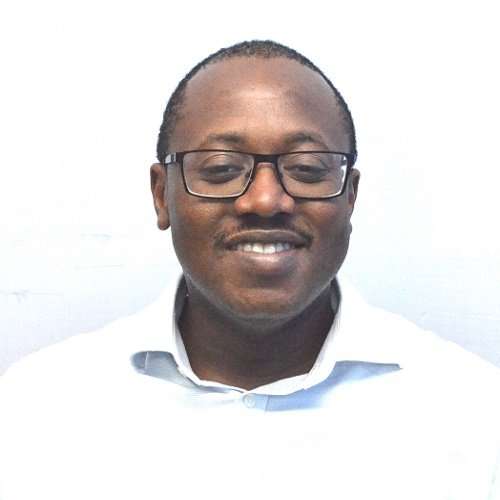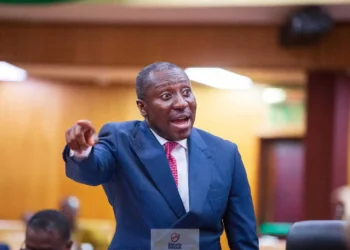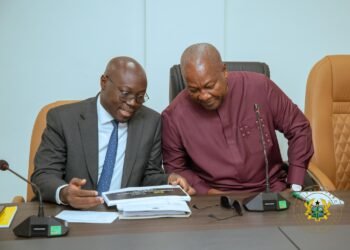In a recent discussion on the role of the Electoral Commission (EC) in voter education and information dissemination, Dr. Kojo Asante, the Director of Advocacy and Policy Engagement at the CDD, highlighted the importance of utilizing multiple platforms to inform and educate the electorate.
Dr. Kojo Asante recommended that the EC implement “varying channels to disseminate information so the electorate will be adequately informed,” especially through their official website, which is set to be a focal point for election day updates and polling station results.
He noted that many in this age group might not access traditional media outlets for their information, instead relying on platforms such as Snapchat and other social media channels.
“If over 10,000,000 voters are between the ages of 18 and 35, how are we reaching them? Where are they getting their news?”
Dr. Kojo Asante the Director of Advocacy and Policy Engagement at the CDD
He emphasized the importance of crafting messages specifically tailored to the online habits of younger voters.
The EC website, already slated for the publication of polling station results, could serve as a key source for voter education materials.
However, Dr. Kojo Asante argued that these materials need to go beyond traditional text formats. Interactive content, visuals, and infographics could better capture the attention of young voters, providing a more engaging way to understand their role in the democratic process.
Building Awareness on Voting Procedures and Security
“The EC and the NCC should start early on the public awareness campaign on voting and counting procedures, results announcement, and declaration.”
Dr. Kojo Asante the Director of Advocacy and Policy Engagement at the CDD
In addition, Dr. Kojo Asante highlighted the role of the National Security Task Force, which works with the EC to manage security around polling areas.
He expressed concerns regarding voters’ fear of violence and uncertainty surrounding polling center security.
“People need clarity as to what would happen when they are in the polling areas and also in the coalition center.”
Dr. Kojo Asante the Director of Advocacy and Policy Engagement at the CDD
This effort, according to Dr. Kojo Asante, would help alleviate fears and encourage voter turnout, especially given the heightened concerns over potential violence during the election period.
Enhancing Transparency in Election Dispute Processes

The conversation also touched on the recent launch of the updated election adjudication manual by the Chief Justice.
This manual aims to streamline the process for addressing electoral disputes, particularly petitions related to parliamentary seats. He then raised an advocacy for public education;
“Can we educate the public a little bit as to how these things work, so that when it starts, people know what’s going on?”
Dr. Kojo Asante the Director of Advocacy and Policy Engagement at the CDD
Dr. Kojo Asante pointed out that, while these adjudication procedures are primarily aimed at lawyers, it is essential to inform the public so they can follow and understand the steps involved if election petitions arise.
This approach would ensure that voters are not only aware of their rights but also understand the mechanisms in place to safeguard the integrity of the electoral process.
Combating Misinformation and Disinformation
“Where there is access to information, there is also access to mis and disinformation.
We need a collective effort from our fact checkers, [to] give tips to people on how to verify information, and our regulators to work with media to limit its impact.’’
Dr. Kojo Asante the Director of Advocacy and Policy Engagement at the CDD
With the proliferation of false information on social media platforms, Asante called for vigilance and the promotion of media literacy among voters.
This collective effort to address misinformation is especially critical in the lead-up to the elections, where disinformation campaigns can easily sway public perception and undermine the credibility of the electoral process.
Encouraging Proactive Citizen Engagement
Dr. Serebour Quaicoe, the Director of Training at the EC, echoed the importance of citizen engagement, urging voters to proactively seek updates from the EC’s website as election day approaches.
He noted that the EC has been actively advertising essential information and election timelines.
“We advertise, and so if you didn’t hear, that means maybe you are so busy,” he remarked, encouraging citizens to occasionally check reliable news sources to stay informed.
Dr. Quaicoe acknowledged the challenges of reaching every individual directly, especially considering the sheer scale of voter turnout expected in the general elections.
“The issue is that there’s no way we can be targeting the individuals, so once in a while, listen to the news, and it will be done.’’
Dr. Serebour Quaicoe Director of Training at the EC
In summary, the discussion emphasized the EC’s responsibility in ensuring a well-informed electorate by expanding outreach through digital and traditional channels, increasing transparency in election procedures, and addressing security concerns at polling stations.
Dr. Kojo Asante’s perspective on reaching younger voters underscored the importance of meeting citizens where they already engage.
With the rise of misinformation, it is crucial that the EC collaborates with media, fact-checkers, and regulatory bodies to ensure the dissemination of accurate information.
Through these efforts, the EC and related institutions can strengthen civic engagement, empower voters, and enhance confidence in the electoral Commission and Process.























